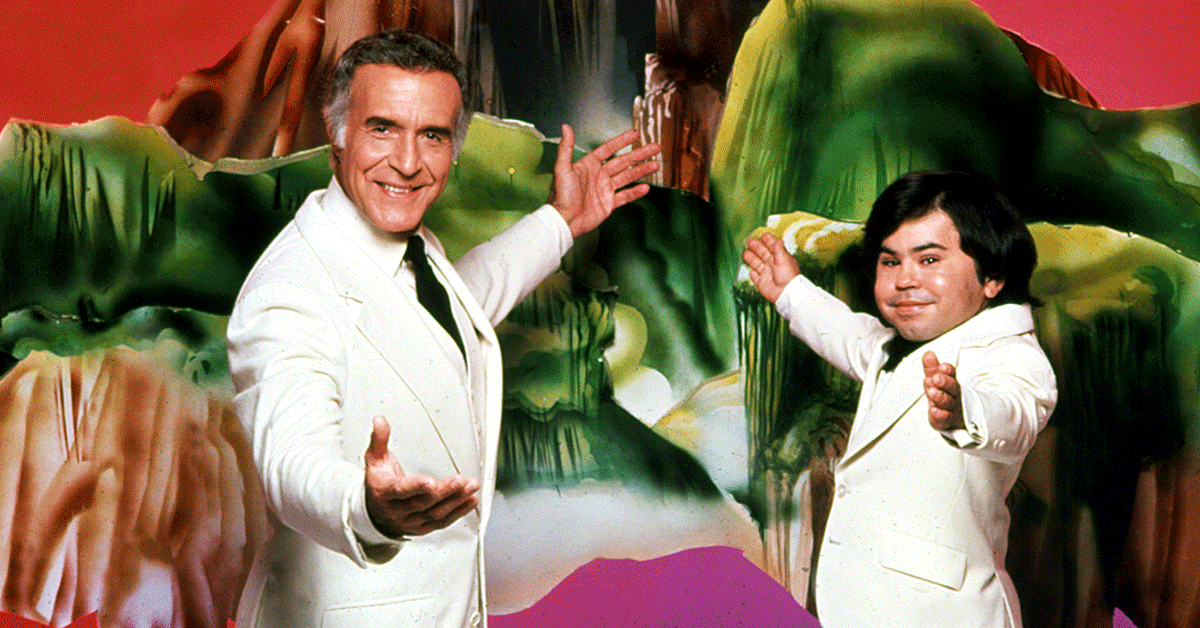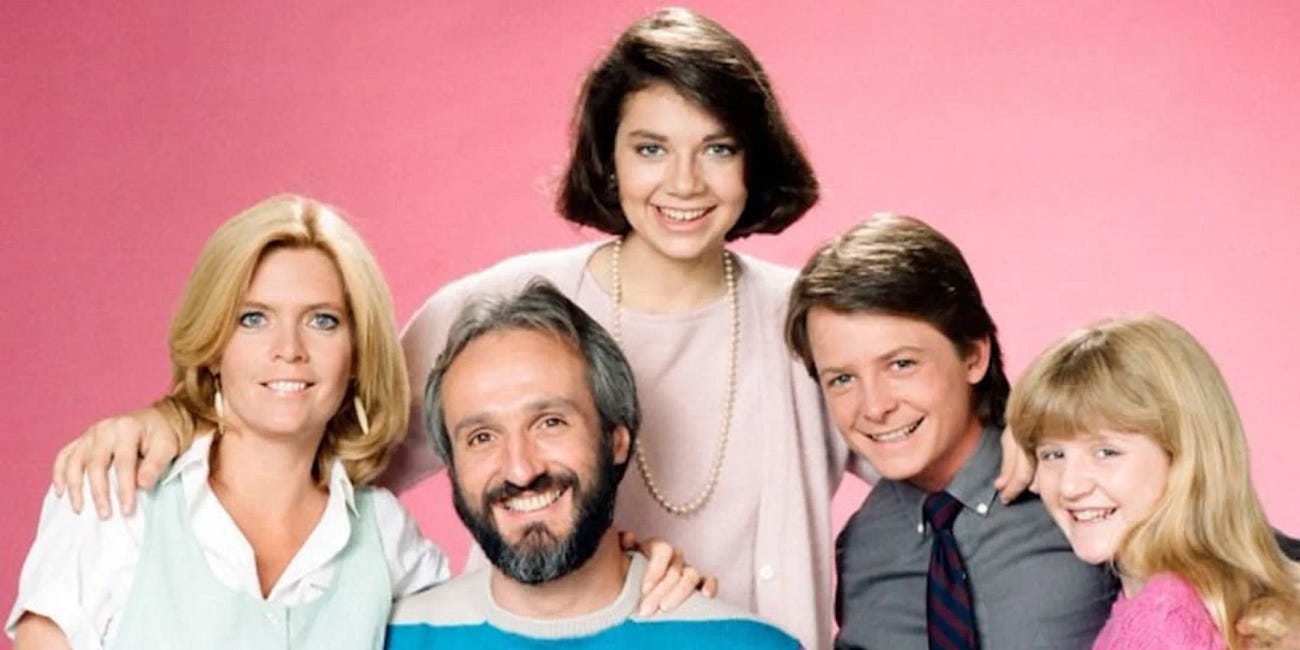Randy Newman - Short People
The satire in this 1977 hit song was lost on a vertically challenged 10 year-old kid; 5 years later, Michael J. Fox would provide the representation short dudes the world over were clamoring for

I’m 5’3”.
No, actually I’m probably closer to 5’2”, as I come from a long-line of shorties who shrink as they age.
I’m praying that 30-plus years of yoga and daily hanging from a pull-up bar have slowed that inevitable progression (regression?). It’s likely only lengthened my arms, hastening the transition back to my simian origins.
Back in November, I wrote about how I was born with a “tail,” along with an exploration of three versions of the song “Monkey Man.” You can check it out here:
For most of my young life I was the shortest boy in my grade. I can probably omit the word “boy” from that sentence. Though by the 5th grade I was finally taller than Darla Robinson who was 4’1” to my 4’2”.
I didn’t hit the 5 foot tall mark until high school.
Despite my diminutive stature, I didn’t get bullied too badly growing up as I was athletic, could run fast and was funny.
I could make the girls laugh. And I could make the boys laugh too, which was a vitally important tool in my bully-response kit. And if the bruiser boys didn’t like my jokes, I could talk about the Los Angeles Dodgers, or the Lakers or the Rams. And if that didn’t work and I had nowhere to run, the girls would defend me.
“Why don’t you pick on someone your own size,” Carrie Hamburg or Sarah Anderson would say, their arms across their chests in a show of camaraderie. Even the bullies knew that you didn’t want to get on the wrong side of the girls.
When our family moved to a new city the summer before 6th grade, that all changed.
The height (and muscle) differential between me and the other boys at Lindero Canyon Middle School expanded exponentially. I started to get acne. I didn’t know anyone at my new school. Self-doubt replaced self-possession as my dominant inner trait.

I would eventually make a few friends and become a pitcher for my new little league team, but by 8th grade I fell into the stoner crowd. I remember getting high before Hebrew school, in preparation for my Bar Mitzvah. I didn’t get high on the day of my Bar Mitzvah though. That level of pot-headedness would come a couple years later.
My friends and I would ride our dirt bikes down to Oak Park, climb into some tall sewer piping and take bong rips. Then Marc Cribari would try and freak us out, claiming to hear the squeals of wild animals coming from further down the sewer. “Run! It’s coming fast!” We’d all shriek and flail our arms, racing to the pipe’s entrance to escape.
My awkwardness and self-consciousness back then was not overtly related to my height. I was always short; what was new was this puberty thing. This uncontrollable erection thing. This being deathly afraid to talk to girls after having them be the majority of my friends in elementary school thing.
But my size did play a role in my teenage angst and anxiety. The only example of a short man in popular culture was Tattoo from the hit ABC TV show Fantasy Island. If I had a dollar for every time some idiot at school would come up to me, pinch their nose, point at the sky and shout “Da plane, da plane!” I would have a couple hundred bucks.
This teasing bothered me, though I would never show it. I knew that being a good sport when being made fun of was the right response. I still believe that.
Thankfully, by the time I got to high school, a role model for short boys like me would grace our television screens (and soon, movie theaters) on a new hit series that would air for the next eight years.1
Of course I’m talking about Michael J. Fox from the ‘80s sitcom Family Ties.
I wrote about this iconic show a few weeks ago. You can check out that piece below.
Michael J. Fox as eldest son Alex P. Keaton was a revelation to me.
Not just in terms of his comedic chops and natural acting abilities, but for giving what could have been a 2-dimensional character real pathos and vulnerability. The fact that he was 5’4”, while not ignored, never became the butt of jokes.
Family Ties was the first time I saw someone like me on TV. When Alex would date girls on the show who were taller than him — it blew my young mind. And I’d never seen a character show nervousness, awkwardness and false bravado as naturally as Michael J. Fox.
When he would go on to star in Back To The Future and Teen Wolf in 1985, I was in the theater the first weekend.
I likely would have discovered my own voice and confidence without Family Ties and watching Michael J. Fox on TV and the movies. I don’t want to over-credit one show and one man. But how does one measure such a thing? Maybe I’m under-crediting the impact Michael J. Fox had on me. It’s only as an adult that I’m even recognizing his influence.
Still: A Michael J. Fox Movie
Last week my wife and I watched the new documentary on Michael J. Fox’s life, Still: A Michael J. Fox Movie (AppleTV+).
I remember when it became public that Michael had been struggling with Parkinson’s Disease. It was 1998, in the 3rd season of his popular TV sitcom Spin City, created by Gary David Goldberg (no relation) who’d created Family Ties. Fox could no longer hide his trembling body from the camera and knew he had to come clean.
The documentary is structured around Michael’s current day life dealing with the progressive, incurable disease of Parkinson’s. The film expertly weaves in his childhood, his relationship with his father, his early days struggling to become an actor and his big break with Family Ties.
It’s not trying to be comprehensive, which is the film’s strength. It uses footage from the massive archive of Fox’s TV and film history to support his real life journey. It’s a masterful editing accomplishment.
In the documentary, Michael talks about his size, and how he ended up playing young kids as a sixteen year old actor. He was told he was too small for most of the age-appropriate roles he’d audition for. Even with Family Ties, he was 20 when the first season aired and 28 when it ended. I don’t think anyone thought, “he’s way too old for a high-schooler.”
What I appreciated was that Fox’s physical stature was treated as merely a factor in the story of his life and career. Not a trauma. Not a massive obstacle for him to overcome.
It’s something I have needed to remind myself of at various stages in my life.
Don’t Like No Short People
I was 10 when Randy Newman’s album Little Criminals was released in 1977. The first track, “Short People,” became a world-wide hit and was played seemingly everywhere, on every radio station in my southern California suburb.
The song garnered a lot of controversy.
Newman, in his defense, tried to explain that the song was commenting on how folks will find something to fault in other groups of people no matter how ridiculous the perceived difference. Haters gonna hate and all that. But the thing with biting satire like “Short People” is that the vast majority of the population is not going to pick up on it.
They will hear lines like:
They got little hands
And little eyes
And they walk around
Tellin' great big lies
They got little noses
And tiny little teeth
They wear platform shoes
On their nasty little feet
and not the refrain, where Newman sings:
Short people are just the same
As you and I
(A fool such as I)
All men are brothers
Until the day they die
(It's a wonderful world)
What I imagine occurred is Randy Newman chose shortness arbitrarily as a physical trait to focus his song on because he was not a small person. Perhaps he thought: “No one has anything mean to say about short people, I’ll sing about them!”
But ask a short person if they’ve every experienced prejudice based on their height and I would bet the majority of them would say yes.
Heightism is a real thing. Not just for short folks but also for those taller than the norm. The prejudicial experiences of the tall are quite different than the short, but we both struggle to fit in with those whose bodies are closer to the definition of “normal sized.”
I can imagine that some people might respond to this with something akin to: “Grow a thicker skin. We all struggle in our own ways. Don’t create prejudice where there isn’t any.”
In this world of identity politics it’s easy to call someone who brings up a form of prejudice that isn’t in the common lexicon of acceptance, politically correct.
But in terms of heightism, it doesn’t take much to prove the case. I won’t bore you with a long list of studies, but here’s one from Malcolm Gladwell’s book Blink. (The book was published in 2005, so these numbers are likely much higher today.)
It is estimated that an inch of height is worth an extra $789 (£699) a year in salary. This means that a man who is 6ft tall, might earn $7,890 more a year than a man of 5’2”. Over the course of a 40-year career, that could amount to a difference of $315,600.
There’s a much wider pay dichotomy for short women. Yes, it’s there for all women, but short women in particular earn much less than their taller counterparts, both women and men.
It’s baked into most societies. Especially in the West. Taller equates to stronger and more powerful. More capable. A short man who exhibits assertiveness, who doesn’t back down from a challenge has a Napoleonic complex. In heterosexual couples it’s extremely rare to see a taller woman with a shorter man. It happens, and people like to say, “what about Tom Cruise and Nicole Kidman.” They might even mention Michael J. Fox and Tracy Pollan.
Mentioning the exception to the rule only makes the case for the existence of prejudice stronger. If people are able to so quickly toss out celebrities where the man is shorter than the woman, that proves the point. The response to someone who says that to me might be, “Okay, name me ten couples where the woman is taller than the man.”
There will most likely be a lot of hemming and hawing. If I said “name ten couples where the man is taller than the woman,” it would surely be no problem whatsoever.
I believe there’s one human trait that can obliterate any minimizing of other people’s experiences that are not our own. And that is empathy.
If we can put ourselves in other people’s shoes, we can see their struggles are real. I truly think it’s as simple as that.
Do I think Randy Newman had good intentions when he wrote and recorded “Short People”? Yes, I do.
But what is the famous saying? The road to hell is paved with good intentions?
I was not scarred by the song “Short People.” I do remember feeling icky about it, as my entire family is short. But I also recognized that it was a catchy song. And I did notice the refrain and might have picked up on the satire element.
When the summer was over and I showed up to Mrs. Hamilton’s 5th grade class that first day of school and realized I finally gained an inch on Darla Robinson, I internally celebrated not being the shortest kid. It felt good, but If I was the shortest, I would have been fine too.
Like Popeye said in the famous 1933 cartoon, “I yam what I yam and that’s all that I yam.”2
I had all I needed: the gift of gab, a pack of girls ready to beat up any bullies who might try and mess with me and legs that could run fast.
There’s a great article at bbc.com on one man’s experience with heightism and is where I learned of the Malcolm Gladwell book and study.
Do you remember the song “Short People”? Remember it at the time it came out or later? Do you recall your thoughts about it?
I’d love to hear your thoughts on unrecognized prejudices how we might learn to recognize them better.
I know this was a long one. Thanks for sticking it out to the end!
One of my short sports heroes, the 5’3” star basketball player Mugsy Bogues, would not begin playing in the NBA until 1987.
https://en.wikipedia.org/wiki/I_Yam_What_I_Yam









Nice to hear some positive things about all my fellow shorties, as I am one and have been one all my life! Never mor than 4'10" and at 70 now with osteoarthritis,4'6". All my life I have been the object of ridicule, stares from children to adults, and comments about my name as well as my height! I have learned to stand my ground and respond to the situation with the firm empathy I have acquired. Michael Fox rocks! A man of all men who let's nothing hold him back. Loved Family ties!
Thanks, Steve....pretty dang impressive! As a former 4th and 5th grade teacher, I had to (and was eager to) deal with all the psychological wounds this or that kid may have been suffering (however real or imagined). "Height disadvantage" came up on occasion, as did chubbiness, nerdiness, and niceness, all of which were targets for the low-self-esteem crowd who peddled in the bully trade.
Mine, at least around junior high, was a width disadvantage....but, while height is what it is, I coulda lost weight, and eventually did in high school, largely to my becoming a rock band's lead singer! No one wants a fat lead singer, despite what Bachman-Turner Overweight would tell you!
This line, though, is so rich, deep, and I'm in awe, 'cause I wish like everything I had thought of it: "Even the bullies knew that you didn’t want to get on the wrong side of the girls." So much psych drama and adolescent angst to delve into with that observation! You touched on it, briefly, though, with your sudden middle school realization of the fear of, now, even talking to the same girls you were palsy-walsy with just a few months ago! And, the old "uncontrollable erection"---At 68, how I long, again, for THOSE days!!! Hell, I'd kill for "controllable"!! You're still over a dozen years away from THAT....uh, "height discrepancy," Boobie!
As for Randy Newman (who's scored his own list of films in his career), did you know he's had a family filled with successful film-music composers/scorers? He had three uncles who were Hollywood film-score composers: Alfred Newman, Lionel Newman, and Emil Newman.
I have, and still admire, your unflinching ability to talk about yourself....despite....even WITH the open wounds, however far they may be in the rear-view mirror! I will use you (I often do, anyway!) as an inspiration when I write my rock band story this summer (for paid subbies, only, which I'm proud you are!), as there are a couple of self-doubt issues for me at play during that time-frame!
As for other "short people" songs, about 5 years before Newman's song, another Warner Bros. artist (Newman was on WB proper, while this artist was on Capricorn, distributed by WB), Martin Mull, wrote his paean to the less tall (around 1972). "Margie the Midget"....Marty (79 like Randy), always a comedic actor (I'd be willing to bet he guested on "Family Ties" at least once!), and comic songwriter/singer, has far less of a "parody excuse" to fall back on for this one:
One of my favorite (only because of the brilliant, outlandish word picture he paints) lines has always been: "Walking hand in ankle, her arm around my sock." (It's this song that prompted my receipt of a pair of Warner Bros./Martin Mull promo socks 5 decades ago, with his mug on 'em!) Here are its lyrics: https://genius.com/Martin-mull-margie-the-midget-lyrics
So, if a "short people" playlist is in the offing (maybe not a bad idea.....you could add a link to this article), don't leave out Marty!
Thanks again, Steve! Fabulous and entertaining, as we've come to expect!